广东省金牌中考2016中考英语总复习语法专题课件:专题七 连词和状语从句(共38张PPT)
文档属性
| 名称 | 广东省金牌中考2016中考英语总复习语法专题课件:专题七 连词和状语从句(共38张PPT) |

|
|
| 格式 | zip | ||
| 文件大小 | 229.2KB | ||
| 资源类型 | 教案 | ||
| 版本资源 | 通用版 | ||
| 科目 | 英语 | ||
| 更新时间 | 2016-03-12 00:00:00 | ||
图片预览

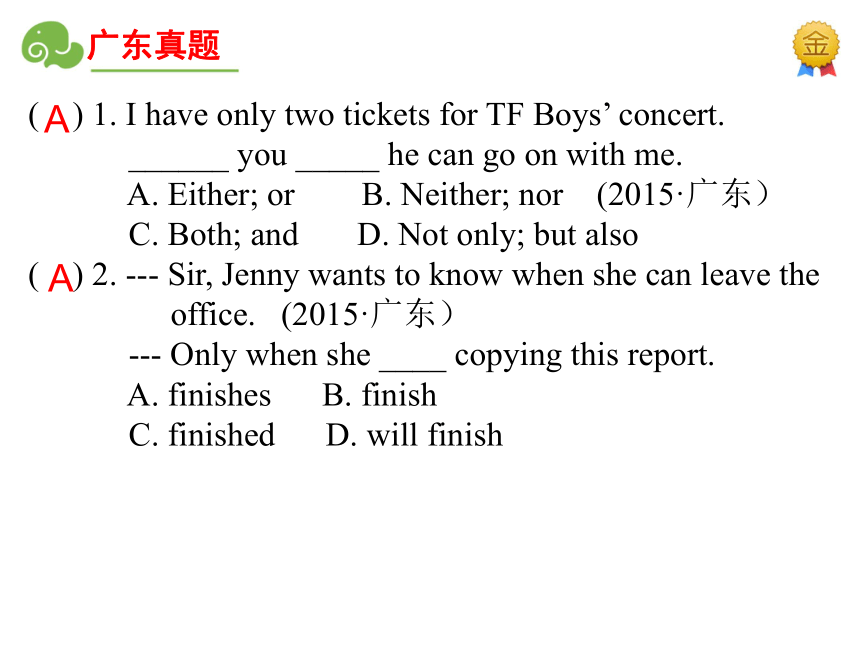
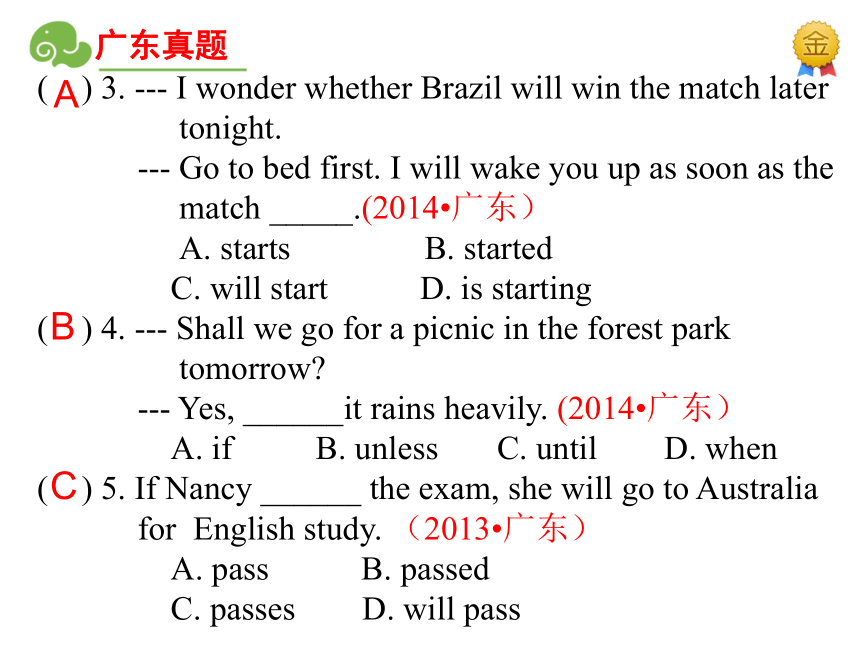
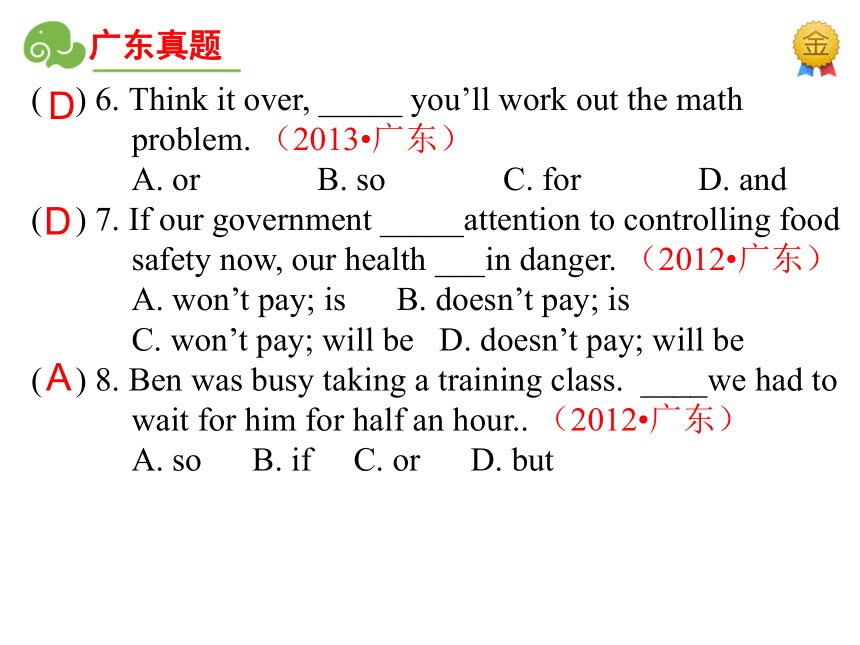
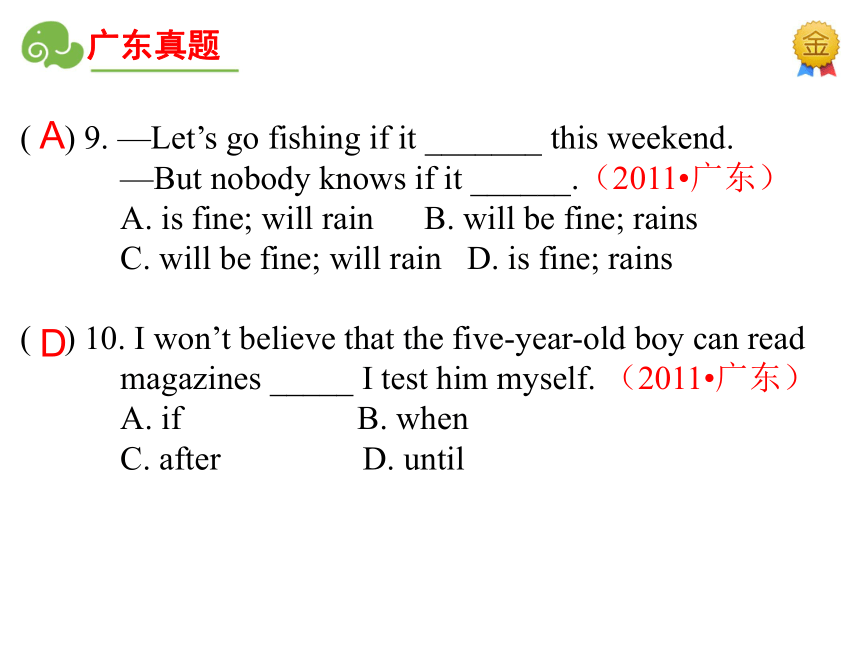
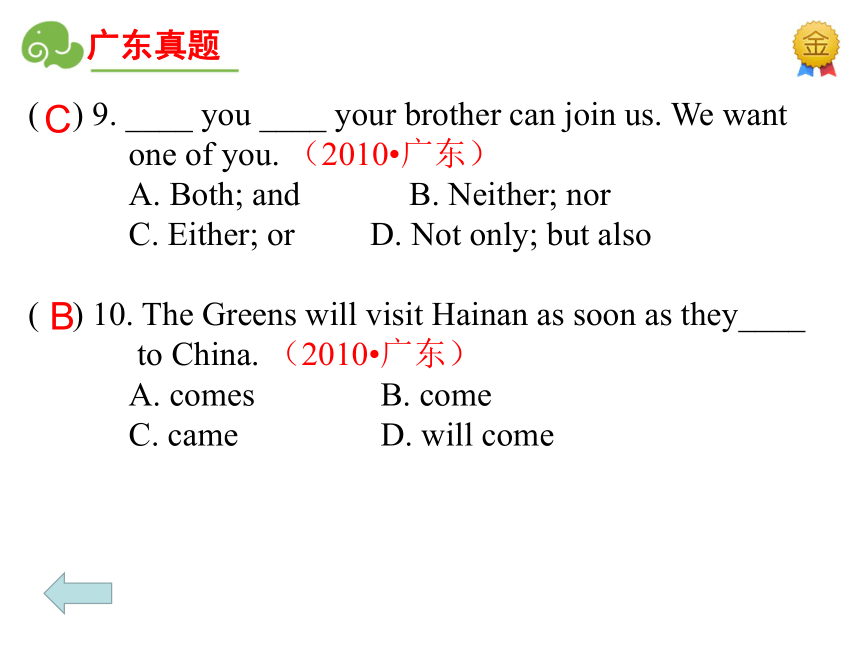
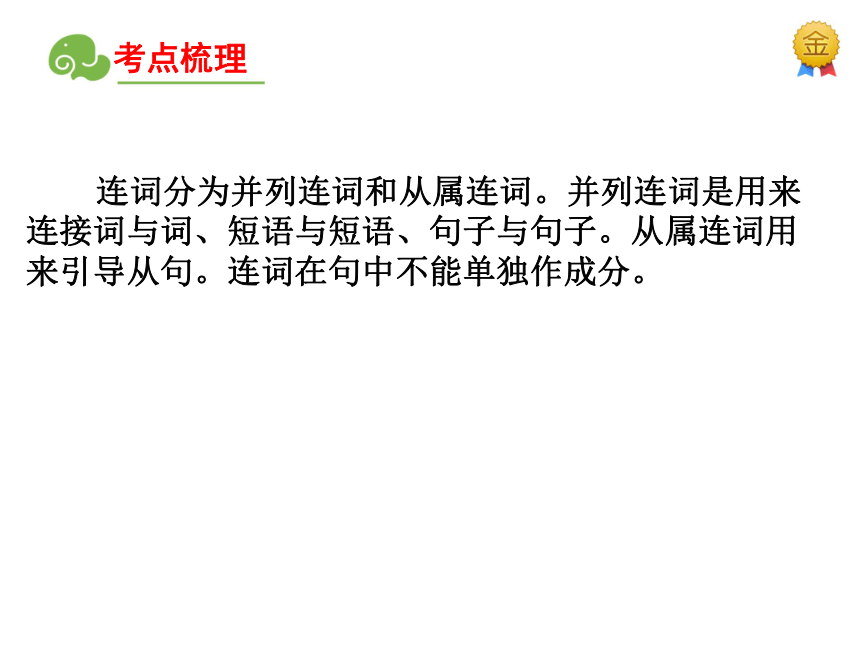
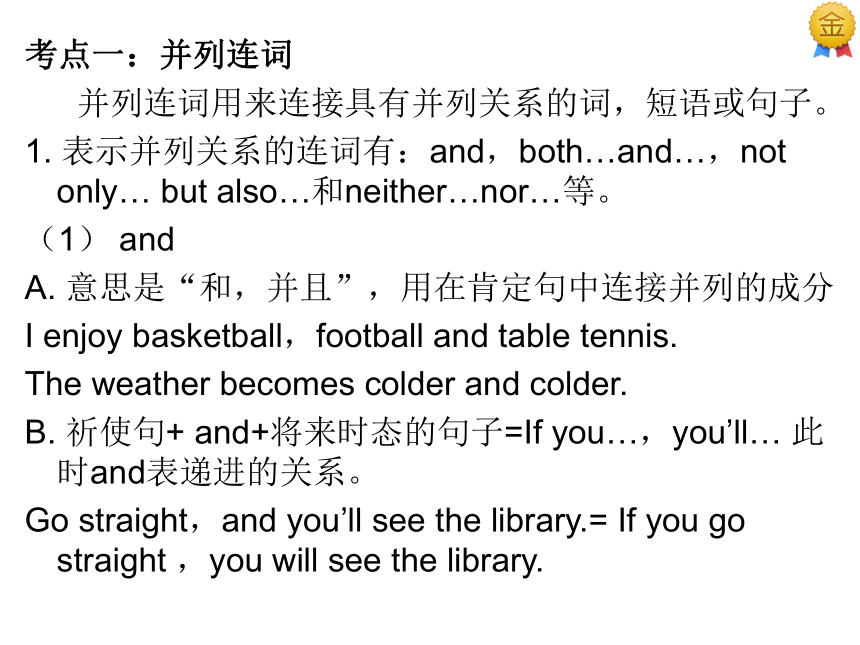
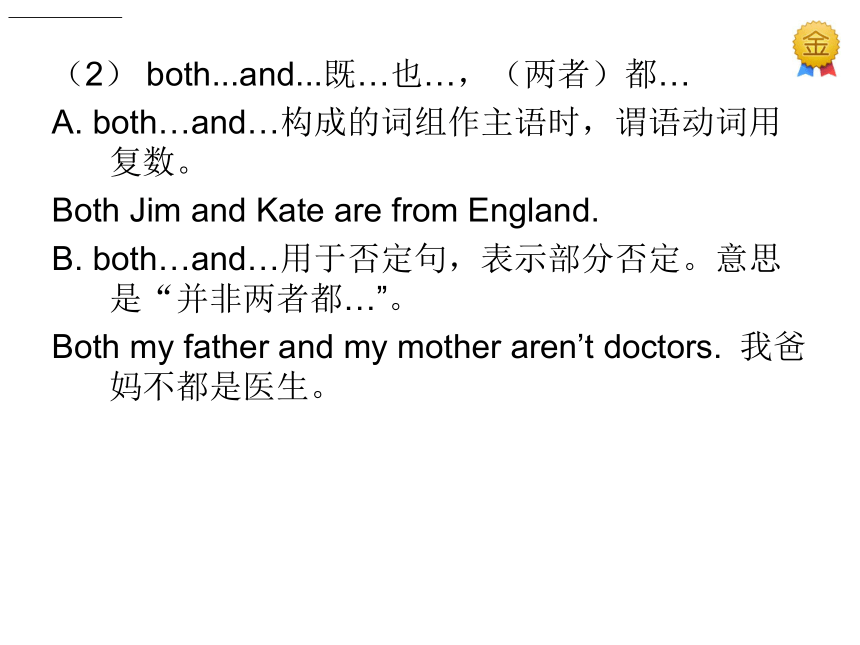
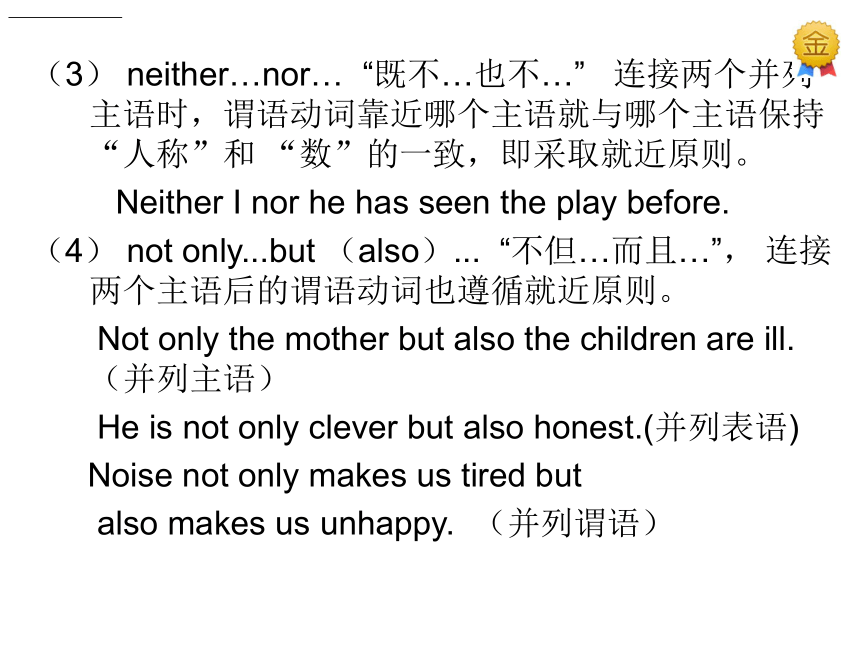
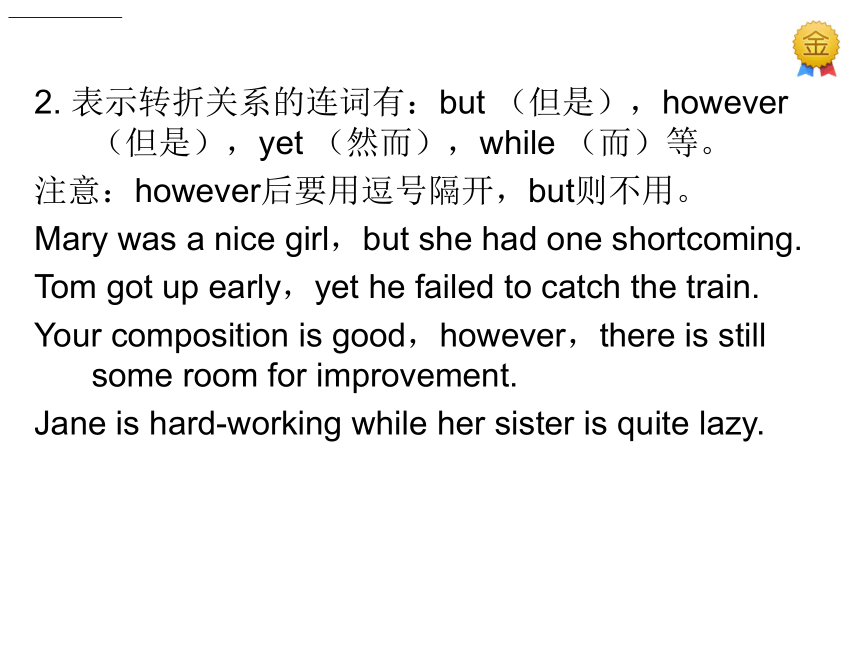
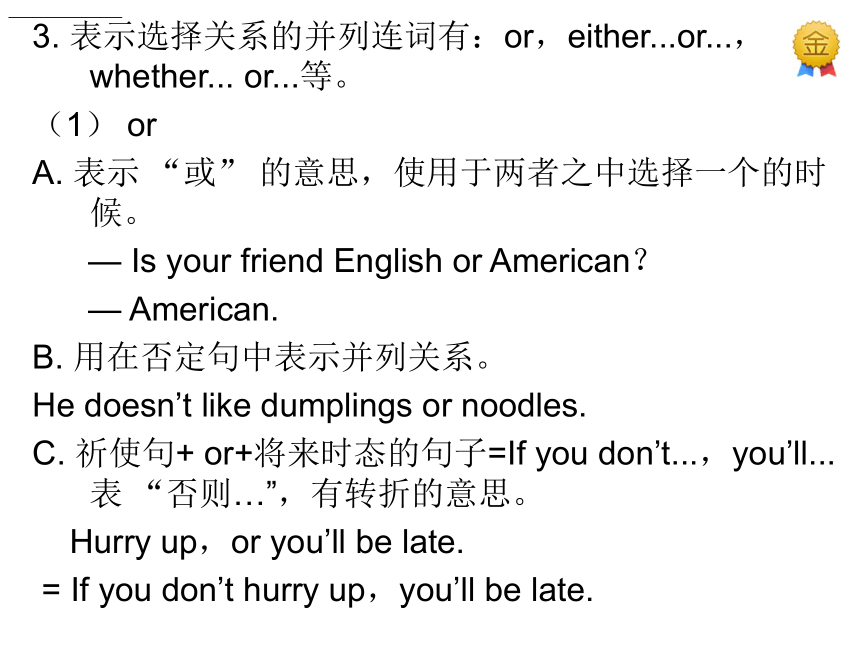
文档简介
课件38张PPT。 第一轮复习 语法专题
专题七 连词和状语从句( ) 1. I have only two tickets for TF Boys’ concert.
______ you _____ he can go on with me.
A. Either; or B. Neither; nor (2015·广东)
C. Both; and D. Not only; but also
( ) 2. --- Sir, Jenny wants to know when she can leave the
office. (2015·广东)
--- Only when she ____ copying this report.
A. finishes B. finish
C. finished D. will finish AA 广东真题 广东真题( ) 3. --- I wonder whether Brazil will win the match later
tonight.
--- Go to bed first. I will wake you up as soon as the
match _____.(2014?广东)
A. starts B. started
C. will start D. is starting
( ) 4. --- Shall we go for a picnic in the forest park
tomorrow?
--- Yes, ______it rains heavily. (2014?广东)
A. if B. unless C. until D. when
( ) 5. If Nancy ______ the exam, she will go to Australia
for English study. (2013?广东)
A. pass B. passed
C. passes D. will passBAC( ) 6. Think it over, _____ you’ll work out the math
problem. (2013?广东)
A. or B. so C. for D. and
( ) 7. If our government _____attention to controlling food
safety now, our health ___in danger. (2012?广东)
A. won’t pay; is B. doesn’t pay; is
C. won’t pay; will be D. doesn’t pay; will be
( ) 8. Ben was busy taking a training class. ____we had to
wait for him for half an hour.. (2012?广东)
A. so B. if C. or D. butD 广东真题DA( ) 9. —Let’s go fishing if it _______ this weekend.
—But nobody knows if it ______.(2011?广东)
A. is fine; will rain B. will be fine; rains
C. will be fine; will rain D. is fine; rains
( ) 10. I won’t believe that the five-year-old boy can read
magazines _____ I test him myself. (2011?广东)
A. if B. when
C. after D. untilAD 广东真题( ) 9. ____ you ____ your brother can join us. We want
one of you. (2010?广东)
A. Both; and B. Neither; nor
C. Either; or D. Not only; but also
( ) 10. The Greens will visit Hainan as soon as they____
to China. (2010?广东)
A. comes B. come
C. came D. will comeCB 广东真题 考点梳理 连词分为并列连词和从属连词。并列连词是用来连接词与词、短语与短语、句子与句子。从属连词用来引导从句。连词在句中不能单独作成分。考点一:并列连词
并列连词用来连接具有并列关系的词,短语或句子。
1. 表示并列关系的连词有:and,both…and…,not only… but also…和neither…nor…等。
(1) and
A. 意思是“和,并且”,用在肯定句中连接并列的成分
I enjoy basketball,football and table tennis.
The weather becomes colder and colder.
B. 祈使句+ and+将来时态的句子=If you…,you’ll… 此时and表递进的关系。
Go straight,and you’ll see the library.= If you go straight ,you will see the library.(2) both...and...既…也…,(两者)都…
A. both…and…构成的词组作主语时,谓语动词用复数。
Both Jim and Kate are from England.
B. both…and…用于否定句,表示部分否定。意思是“并非两者都…”。
Both my father and my mother aren’t doctors. 我爸妈不都是医生。 (3) neither…nor… “既不…也不…” 连接两个并列主语时,谓语动词靠近哪个主语就与哪个主语保持 “人称”和 “数”的一致,即采取就近原则。
Neither I nor he has seen the play before.
(4) not only...but (also)... “不但…而且…”, 连接两个主语后的谓语动词也遵循就近原则。
Not only the mother but also the children are ill. (并列主语)
He is not only clever but also honest.(并列表语)
Noise not only makes us tired but
also makes us unhappy. (并列谓语) 2. 表示转折关系的连词有:but (但是),however (但是),yet (然而),while (而)等。
注意:however后要用逗号隔开,but则不用。
Mary was a nice girl,but she had one shortcoming.
Tom got up early,yet he failed to catch the train.
Your composition is good,however,there is still some room for improvement.
Jane is hard-working while her sister is quite lazy.
3. 表示选择关系的并列连词有:or,either...or...,whether... or...等。
(1) or
A. 表示 “或” 的意思,使用于两者之中选择一个的时候。
— Is your friend English or American?
— American.
B. 用在否定句中表示并列关系。
He doesn’t like dumplings or noodles.
C. 祈使句+ or+将来时态的句子=If you don’t...,you’ll... 表 “否则…”,有转折的意思。
Hurry up,or you’ll be late.
= If you don’t hurry up,you’ll be late.
(2) either...or... “或者…或者…;不是…就是…;要么…要么…” 连接两个并列主语时,谓语动词靠近哪个主语就与哪个主语保持 “人称”和 “数”的一致,即就近原则。
Either you or I am right.
Does either she or they like English?
(3) whether...or... “不管…还是…”
She is always cheerful,whether at
home or at school.
4. 表示因果关系的并列连词有:for(因为),so(所以)。
He is not at school today,for he has a bad cold.
It was late,so I went home.
5. 注意although/ though和but,because和so这两对
词不能用在同一个句子中。
我们不能说“Although he is over sixty,but he works as hard as others.”
这个句子应改为:
Although he is over sixty,he works as hard as others. = He is over sixty,but he works as hard as others.
我们不能说“Because John was ill,so I took him to the doctor.”
这个句子应改为
Because John was ill,I took him to the doctor.
= John was ill,so I took him to the doctor. D B 考点再现D 考点二:从属连词
从属连词用来引导从句。常见的从属连词有:
1. 引导时间状语从句的after, before,when,while,as,until,till,since,as soon as (一…就…)等。
2. 引导条件状语从句的if,unless (如果…不…,除非) 等。
3. 引导原因状语从句的because,as,since等。
4. 引导目的状语从句的so that,in order that等。
5. 引导让步状语从句的though,although,even if (即使),even though(即使)等。
6. 引导结果状语从句的so…that…,such…that…等。
7. 引导比较状语从句的than,as…as等。
8. 引导地点状语从句的where等。
考点三:状语从句
用来修饰主句中的动词,副词和形容词的从句叫
状语从句。根据其含义状语从句可分为时间状语从
句,条件状语从句,原因状语从句,结果状语从句,
比较状语从句,目的状语从句,让步状语从句,地
点状语从句。1. 时间状语从句
(1) 时间状语从句常用when, while,before,after,since,till,until,as soon as等连词来引导。
在时间状语从句里,主句如果用一般将来时,从句要用一般现在时表将来的动作或状态。主句如果用过去时,从句也要用过去时。即主将从现,主过从过。
I’ll ring you up as soon as I get to New York.
I will tell him everything when he comes back.
He won’t believe it until he sees it with his own eyes.
He had learned a little Chinese before he came to China.
After he finished middle school,he went to work in a factory. (2) not…till/until其含义是“直到……才……”,“在……以前不……”,谓语动词要用瞬间动词。
till/until其含义是“一直到……时”,谓语动词只能用延续性动词。
The young man read till the light went out.
Let’s wait until the rain stops.
We won’t start until Bob comes.
Don’t get off until the bus stops. (3) while,when都可引导时间状语从句,但用法有所不同。
A. when即可引导一个持续性的动作,也可引导一个短暂性的动作。可用于主句和从句同时发生或从句动作先于主句动作。
The film had been on when we arrived.
When John arrived,I was cooking lunch.
It was raining hard when I got to school yesterday.
B. when还有“这时,突然”的意思,表某件事情正在发生,这时突然发生另一件事。
He was doing his homework
when the telephone rang. C. while 引导的动作必须是持续性的,强调当两个长动作同时进行。
While mother was cooking lunch,I was doing my homework.
As/When/While I was walking down the street I noticed a police car.
D. while 还可以做并列连词,表示对比关系“然而”。
I like reading books while he likes watching TV.
2. 条件状语从句
(1) 条件状语从句通常由if,unless (如果…不…,除非)引导。
What shall we do if it snows tomorrow?
Don’t leave the building unless I tell you to.
(2) 在条件状语从句里,谓语动词通常用现在时态表示将来的动作或状态。
I’ll help you with your English if I am free tomorrow.
He won’t be late unless he is ill.
(3) “祈使句 + and (or)+ 陈述句” 在意思上相当于一个带有条件状语从句的复合句。
Hurry up,or you’ll be late.
=If you don’t hurry up,you’ll be late.
Study hard and you will pass the exam.
=If you study hard,you will pass the exam. 3. 原因状语从句
(1) 原因状语从句通常由because,since,as引导。
He didn’t come to school because he was ill.
As it is raining,we shall not go to the zoo.
Since you can’t answer the question,I’ll ask someone else. (2) because表示直接原因,语气最强。because引导的原因状语从句多放在主句之后。回答由why提出的问题,只能用because,because和so不能同用在一个句子里。as和since语气较弱,一般用来表示明显的原因。由as(由于)和since(既然)引导的原因状语从居多放在句首。
— Why aren’t going there?
— Because I don’t want to.
As he has no car,he can’t get there easily.
Since we have no money,we can’t buy it. 4. 结果状语从句
(1) 结果状语从句由so…that,such…that引导。
He is so poor that he can’t buy a bike for his son.
She is such a good teacher that everybody likes her.
My pencil fell under the desk,so that I couldn’t see it.
(2) so…that与such...that可以互换。
A. 在由so...that引导的结果状语从句中,so是副词,与形容词连用。
其结构是: “ so + 形容词(副词)+ that + 从句”。
He was so glad that he couldn’t say a word.
Mother lives so far away that we hardly ever see her. B. 在由such...that引导的结果状语从句中,such是形容词,它修饰名词。
其结构是: such +a/an +adj.+可数名词单数 + that从句。
such +adj.+不可数名词或可数名词复数 + that从句”。
It was such a hot day that nobody wanted to do anything.
He had such long arms that he could almost touch the ceiling.
He made such rapid progress
that he did very well in the mid-term.
有时上述两种结构是可以互换的。
It was such a wonderful film that all of us wanted to see it again.
=The film was so wonderful that all of us wanted to see it again.
It is such an important match that nobody wants to miss it.
=The match is so important that nobody wants to miss it.
C. 如果名词前由many,much,little,few等词修饰时,只能用so,不用such.
Soon there were so many deer that they ate up all the wild roses.
He has so little time that he can’t go to the cinema with you. 5. 比较状语从句。
比较状语从句通常由as...as,比较级 + than...等连词引导。
Tom runs faster than John does.
This classroom is as big as that one. 6. 目的状语从句。目的状语从句通常由 so that,in order that(为了,目的是)引导。
We started early so that we could catch the first train.
We used the computer in order that we might save time. 7. 让步状语从句
(1) 让步状语从句通常由although,though,even if, even though等连词引导。
Though he is young,he knows a lot.
Although I am tired,I must go on working.
(2) although(though)不能和but用在同一个句子中。
我们不能说:Though it was raining hard,but he still went out.
应该说:Though it was raining hard,he still went out.=It was raining hard,but he still went out. 8. 地点状语从句。地点状语从句常常由where来引导。
Go where you like.
Where there is a will,there is a way.
有志者,事竟成。 AA考点再现A1-5 BCBDA
6-10 CBABB
11-15 CABCC
16-20 ADDAA
21-25 CBACD 中考链接1-5 CABCC
6-10 CCCAB
11-15DCDAA
16-20BADBB
21-25 DBABD
26-30 ADCAB 考点精练Thank You!
专题七 连词和状语从句( ) 1. I have only two tickets for TF Boys’ concert.
______ you _____ he can go on with me.
A. Either; or B. Neither; nor (2015·广东)
C. Both; and D. Not only; but also
( ) 2. --- Sir, Jenny wants to know when she can leave the
office. (2015·广东)
--- Only when she ____ copying this report.
A. finishes B. finish
C. finished D. will finish AA 广东真题 广东真题( ) 3. --- I wonder whether Brazil will win the match later
tonight.
--- Go to bed first. I will wake you up as soon as the
match _____.(2014?广东)
A. starts B. started
C. will start D. is starting
( ) 4. --- Shall we go for a picnic in the forest park
tomorrow?
--- Yes, ______it rains heavily. (2014?广东)
A. if B. unless C. until D. when
( ) 5. If Nancy ______ the exam, she will go to Australia
for English study. (2013?广东)
A. pass B. passed
C. passes D. will passBAC( ) 6. Think it over, _____ you’ll work out the math
problem. (2013?广东)
A. or B. so C. for D. and
( ) 7. If our government _____attention to controlling food
safety now, our health ___in danger. (2012?广东)
A. won’t pay; is B. doesn’t pay; is
C. won’t pay; will be D. doesn’t pay; will be
( ) 8. Ben was busy taking a training class. ____we had to
wait for him for half an hour.. (2012?广东)
A. so B. if C. or D. butD 广东真题DA( ) 9. —Let’s go fishing if it _______ this weekend.
—But nobody knows if it ______.(2011?广东)
A. is fine; will rain B. will be fine; rains
C. will be fine; will rain D. is fine; rains
( ) 10. I won’t believe that the five-year-old boy can read
magazines _____ I test him myself. (2011?广东)
A. if B. when
C. after D. untilAD 广东真题( ) 9. ____ you ____ your brother can join us. We want
one of you. (2010?广东)
A. Both; and B. Neither; nor
C. Either; or D. Not only; but also
( ) 10. The Greens will visit Hainan as soon as they____
to China. (2010?广东)
A. comes B. come
C. came D. will comeCB 广东真题 考点梳理 连词分为并列连词和从属连词。并列连词是用来连接词与词、短语与短语、句子与句子。从属连词用来引导从句。连词在句中不能单独作成分。考点一:并列连词
并列连词用来连接具有并列关系的词,短语或句子。
1. 表示并列关系的连词有:and,both…and…,not only… but also…和neither…nor…等。
(1) and
A. 意思是“和,并且”,用在肯定句中连接并列的成分
I enjoy basketball,football and table tennis.
The weather becomes colder and colder.
B. 祈使句+ and+将来时态的句子=If you…,you’ll… 此时and表递进的关系。
Go straight,and you’ll see the library.= If you go straight ,you will see the library.(2) both...and...既…也…,(两者)都…
A. both…and…构成的词组作主语时,谓语动词用复数。
Both Jim and Kate are from England.
B. both…and…用于否定句,表示部分否定。意思是“并非两者都…”。
Both my father and my mother aren’t doctors. 我爸妈不都是医生。 (3) neither…nor… “既不…也不…” 连接两个并列主语时,谓语动词靠近哪个主语就与哪个主语保持 “人称”和 “数”的一致,即采取就近原则。
Neither I nor he has seen the play before.
(4) not only...but (also)... “不但…而且…”, 连接两个主语后的谓语动词也遵循就近原则。
Not only the mother but also the children are ill. (并列主语)
He is not only clever but also honest.(并列表语)
Noise not only makes us tired but
also makes us unhappy. (并列谓语) 2. 表示转折关系的连词有:but (但是),however (但是),yet (然而),while (而)等。
注意:however后要用逗号隔开,but则不用。
Mary was a nice girl,but she had one shortcoming.
Tom got up early,yet he failed to catch the train.
Your composition is good,however,there is still some room for improvement.
Jane is hard-working while her sister is quite lazy.
3. 表示选择关系的并列连词有:or,either...or...,whether... or...等。
(1) or
A. 表示 “或” 的意思,使用于两者之中选择一个的时候。
— Is your friend English or American?
— American.
B. 用在否定句中表示并列关系。
He doesn’t like dumplings or noodles.
C. 祈使句+ or+将来时态的句子=If you don’t...,you’ll... 表 “否则…”,有转折的意思。
Hurry up,or you’ll be late.
= If you don’t hurry up,you’ll be late.
(2) either...or... “或者…或者…;不是…就是…;要么…要么…” 连接两个并列主语时,谓语动词靠近哪个主语就与哪个主语保持 “人称”和 “数”的一致,即就近原则。
Either you or I am right.
Does either she or they like English?
(3) whether...or... “不管…还是…”
She is always cheerful,whether at
home or at school.
4. 表示因果关系的并列连词有:for(因为),so(所以)。
He is not at school today,for he has a bad cold.
It was late,so I went home.
5. 注意although/ though和but,because和so这两对
词不能用在同一个句子中。
我们不能说“Although he is over sixty,but he works as hard as others.”
这个句子应改为:
Although he is over sixty,he works as hard as others. = He is over sixty,but he works as hard as others.
我们不能说“Because John was ill,so I took him to the doctor.”
这个句子应改为
Because John was ill,I took him to the doctor.
= John was ill,so I took him to the doctor. D B 考点再现D 考点二:从属连词
从属连词用来引导从句。常见的从属连词有:
1. 引导时间状语从句的after, before,when,while,as,until,till,since,as soon as (一…就…)等。
2. 引导条件状语从句的if,unless (如果…不…,除非) 等。
3. 引导原因状语从句的because,as,since等。
4. 引导目的状语从句的so that,in order that等。
5. 引导让步状语从句的though,although,even if (即使),even though(即使)等。
6. 引导结果状语从句的so…that…,such…that…等。
7. 引导比较状语从句的than,as…as等。
8. 引导地点状语从句的where等。
考点三:状语从句
用来修饰主句中的动词,副词和形容词的从句叫
状语从句。根据其含义状语从句可分为时间状语从
句,条件状语从句,原因状语从句,结果状语从句,
比较状语从句,目的状语从句,让步状语从句,地
点状语从句。1. 时间状语从句
(1) 时间状语从句常用when, while,before,after,since,till,until,as soon as等连词来引导。
在时间状语从句里,主句如果用一般将来时,从句要用一般现在时表将来的动作或状态。主句如果用过去时,从句也要用过去时。即主将从现,主过从过。
I’ll ring you up as soon as I get to New York.
I will tell him everything when he comes back.
He won’t believe it until he sees it with his own eyes.
He had learned a little Chinese before he came to China.
After he finished middle school,he went to work in a factory. (2) not…till/until其含义是“直到……才……”,“在……以前不……”,谓语动词要用瞬间动词。
till/until其含义是“一直到……时”,谓语动词只能用延续性动词。
The young man read till the light went out.
Let’s wait until the rain stops.
We won’t start until Bob comes.
Don’t get off until the bus stops. (3) while,when都可引导时间状语从句,但用法有所不同。
A. when即可引导一个持续性的动作,也可引导一个短暂性的动作。可用于主句和从句同时发生或从句动作先于主句动作。
The film had been on when we arrived.
When John arrived,I was cooking lunch.
It was raining hard when I got to school yesterday.
B. when还有“这时,突然”的意思,表某件事情正在发生,这时突然发生另一件事。
He was doing his homework
when the telephone rang. C. while 引导的动作必须是持续性的,强调当两个长动作同时进行。
While mother was cooking lunch,I was doing my homework.
As/When/While I was walking down the street I noticed a police car.
D. while 还可以做并列连词,表示对比关系“然而”。
I like reading books while he likes watching TV.
2. 条件状语从句
(1) 条件状语从句通常由if,unless (如果…不…,除非)引导。
What shall we do if it snows tomorrow?
Don’t leave the building unless I tell you to.
(2) 在条件状语从句里,谓语动词通常用现在时态表示将来的动作或状态。
I’ll help you with your English if I am free tomorrow.
He won’t be late unless he is ill.
(3) “祈使句 + and (or)+ 陈述句” 在意思上相当于一个带有条件状语从句的复合句。
Hurry up,or you’ll be late.
=If you don’t hurry up,you’ll be late.
Study hard and you will pass the exam.
=If you study hard,you will pass the exam. 3. 原因状语从句
(1) 原因状语从句通常由because,since,as引导。
He didn’t come to school because he was ill.
As it is raining,we shall not go to the zoo.
Since you can’t answer the question,I’ll ask someone else. (2) because表示直接原因,语气最强。because引导的原因状语从句多放在主句之后。回答由why提出的问题,只能用because,because和so不能同用在一个句子里。as和since语气较弱,一般用来表示明显的原因。由as(由于)和since(既然)引导的原因状语从居多放在句首。
— Why aren’t going there?
— Because I don’t want to.
As he has no car,he can’t get there easily.
Since we have no money,we can’t buy it. 4. 结果状语从句
(1) 结果状语从句由so…that,such…that引导。
He is so poor that he can’t buy a bike for his son.
She is such a good teacher that everybody likes her.
My pencil fell under the desk,so that I couldn’t see it.
(2) so…that与such...that可以互换。
A. 在由so...that引导的结果状语从句中,so是副词,与形容词连用。
其结构是: “ so + 形容词(副词)+ that + 从句”。
He was so glad that he couldn’t say a word.
Mother lives so far away that we hardly ever see her. B. 在由such...that引导的结果状语从句中,such是形容词,它修饰名词。
其结构是: such +a/an +adj.+可数名词单数 + that从句。
such +adj.+不可数名词或可数名词复数 + that从句”。
It was such a hot day that nobody wanted to do anything.
He had such long arms that he could almost touch the ceiling.
He made such rapid progress
that he did very well in the mid-term.
有时上述两种结构是可以互换的。
It was such a wonderful film that all of us wanted to see it again.
=The film was so wonderful that all of us wanted to see it again.
It is such an important match that nobody wants to miss it.
=The match is so important that nobody wants to miss it.
C. 如果名词前由many,much,little,few等词修饰时,只能用so,不用such.
Soon there were so many deer that they ate up all the wild roses.
He has so little time that he can’t go to the cinema with you. 5. 比较状语从句。
比较状语从句通常由as...as,比较级 + than...等连词引导。
Tom runs faster than John does.
This classroom is as big as that one. 6. 目的状语从句。目的状语从句通常由 so that,in order that(为了,目的是)引导。
We started early so that we could catch the first train.
We used the computer in order that we might save time. 7. 让步状语从句
(1) 让步状语从句通常由although,though,even if, even though等连词引导。
Though he is young,he knows a lot.
Although I am tired,I must go on working.
(2) although(though)不能和but用在同一个句子中。
我们不能说:Though it was raining hard,but he still went out.
应该说:Though it was raining hard,he still went out.=It was raining hard,but he still went out. 8. 地点状语从句。地点状语从句常常由where来引导。
Go where you like.
Where there is a will,there is a way.
有志者,事竟成。 AA考点再现A1-5 BCBDA
6-10 CBABB
11-15 CABCC
16-20 ADDAA
21-25 CBACD 中考链接1-5 CABCC
6-10 CCCAB
11-15DCDAA
16-20BADBB
21-25 DBABD
26-30 ADCAB 考点精练Thank You!
同课章节目录
- 词法
- 名词
- 动词和动词短语
- 动词语态
- 动词时态
- 助动词和情态动词
- 非谓语动词
- 冠词
- 代词
- 数词和量词
- 形容词副词及其比较等级
- 介词和介词短语
- 连词和感叹词
- 构词法
- 相似、相近词比较
- 句法
- 陈述句
- 一般疑问句和否定疑问句
- 特殊疑问句及选择疑问句
- 反意疑问句
- 存在句(There be句型)
- 宾语从句
- 定语从句
- 状语从句
- 主谓一致问题
- 简单句
- 并列句
- 复合句
- 主谓一致
- 主、表语从句
- 名词性从句
- 直接引语和间接引语
- 虚拟语气
- 感叹句
- 强调句
- 倒装句
- 祈使句
- 句子的成分
- 句子的分类
- 题型专区
- 单项选择部分
- 易错题
- 完形填空
- 阅读理解
- 词汇练习
- 听说训练
- 句型转换
- 补全对话
- 短文改错
- 翻译
- 书面表达
- 任务型阅读
- 语法填空
- 其他资料
